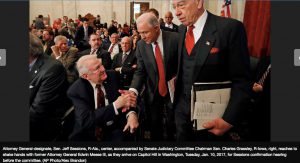Trump & Co: An Old, Familiar Story
It strikes me that so much of Trump’s administration is blatantly recycled Reagan policy — whose failures, remarkably, have been buried in the American public memory.
US Attorney General Jeff Sessions, for example, says he’s reviving the “War on Drugs.”
I wrote for a US Republican-leaning newspaper in 1988, faithfully documenting the first war on drugs, including new federal guidelines for sentencing that promised to “get tough” on drug dealers (and users), as Sessions has now ordered his prosecutors to do.
 In 1988, this was a new system that clearly would rob federal judges of their discretionary power — and hand it over to US prosecutors and police who, understandably, saw convictions and long sentences as part of their own career success.
In 1988, this was a new system that clearly would rob federal judges of their discretionary power — and hand it over to US prosecutors and police who, understandably, saw convictions and long sentences as part of their own career success.
After these stricter sentencing guidelines were passed by Congress, however, liberal civil rights advocates of that time warned that the Justice Department would simply be sending more poor, black men to prison, while protecting white, wealthy and middle-class drug users and their sources.
In my old stories, we see that the first drug war was led by Reagan US Attorney General Edwin Meese — whose humiliation and resignation in July 1988 is, sadly and strangely, purged from Wikipedia today.
Among the lesser scandals that Meese — a former Reagan-campaign-staffer — survived was a federal investigation into his connections and alleged financial improprieties related to his negotiations, around 1985, favoring a Bechtel Corporation plan for an oil pipeline in Iraq. The report of Special Prosecutor James C. McKay cleared Meese of criminal wrongdoing, but criticized him for ethical lapses, especially regarding bribes to Israel, reportedly to insure against an Israeli military attack on the oil-bearing pipeline, from Iraq to Jordan.
The bigger issue (at least, at the time) was Meese’s involvement in the “Iran-Contra” scandal, in which the Reagan administration reimbursed Israel for sending weapons, including Hawk and TOW missiles, to “moderate elements” of the new Islamic government of Iran.
This was the government of Ayatollah Khomeini, whose openly declared goal was to export his Islamic revolution all over the Middle East, overthrowing the governments of Iraq, Kuwait, Saudi Arabia, and the other Persian Gulf states. People of the time were understandably baffled that Reagan and Co. could be assisting any part of the Khomeini regime — much less comprehend that Israel was helping to funnel weapons to it.….

Former US Atty Gen. Edwin Meese congratulates his 2017 successor, Jeff Sessions. Credit: AP
The “Contra” part of the Reagan-era scandal was the parallel arming of right-wing militants (counter-revolutionaries or “contras”), trying to bring a violent end to the socialist Sandinista government of Daniel Ortega in Nicaragua. The Reagan administration’s arming and underwriting of the anti-Sandinista militants secretly went against an expressed prohibition by Congress, and was also the subject of investigation by the special prosecutor. (Analysts today say that Attorney General Edwin Meese helped limit damage to President Reagan himself by narrowly framing the investigation’s principal question as to Reagan’s knowledge of funding-path details, cleverly side-stepping the fact that the president clearly had signed off on both illegal programs.)
The Iran-Contra affair, however, did lead to multiple dismissals and convictions. Among those immediately dismissed were the president’s national security adviser, Navy Admiral John M. Poindexter, as well as Marine Lt. Col. Oliver North, the National Security Council aide accused of masterminding the scheme. Poindexter and North were also among the 11 administration officials convicted for the crimes — although their convictions were later set aside by appellate court decisions.
Five men — including former State Department official Elliott Abrams and former defense secretary Caspar W. Weinberger — were pardoned by President George H.W. Bush on Christmas Eve 1992, just before he left office. Bush Sr. had been Reagan’s vice president while the crimes were taking place.
For their part, Daniel Ortega and his socialist Sandinista Party — with its longtime agenda favoring education, public healthcare, and equal rights for women — survived Reagan’s war against them. They were re-elected in Nicaragua as recently as 2011.
Strange, how things work out….
